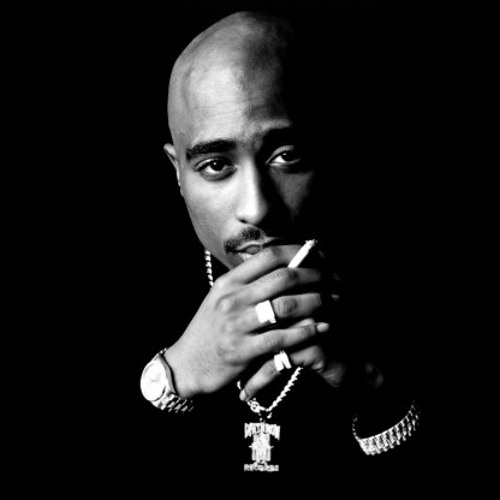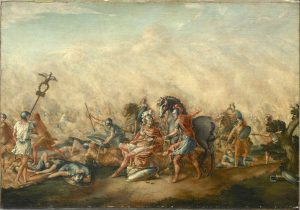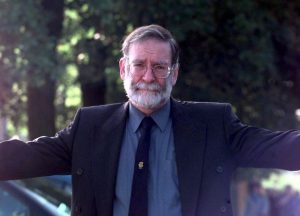Close your eyes and flashback to Harlem, New York in the 1970’s; you hear the unique dialect of thugs, pimps, and prostitutes alongside the upbeat rhythm of culture-rich music. You hear the tension of drug deals, the cries of hungry homeless children out in the cold, and the crackling of the fires of buildings being burnt down and soon to be abandoned. You hear police sirens fill the streets, and the cracking of police batons on the ribs of individuals who plead their innocence. But more importantly, you hear the silent screams of the oppressed on their last straw. Right smack in the middle of this revolutionary explosion, in 1971, was born Lesane Parish Crooks—the future Tupac Amaru Shakur.1

Tupac was born into a family that was deeply rooted in the Black Panther Party. The Black Panthers was a group of African Americans who wore iconic black outfits with black berets and emphasized “black pride.” They fiercely fought for human and civil rights, but more importantly, against police brutality. Although a social movement, they stood out from other movements of that time because, unlike other groups, they used violence to rebel. It was founded by Huey P. Newton and existed through the 1960’s-1970’s.2 His mother, Afeni Shakur, was guilty of 156 counts of crime due to her involvement with the Panther movement, and was in prison while pregnant with Tupac. Although lacking a high school degree, Afeni was incredibly smart. She was known for her public speaking, and when eight months pregnant, she acted as her own lawyer and won the case, getting her released from prison on account of a lack of evidence.3 From early in his life, Tupac lacked a father figure, and it is because of this that he was especially close to his mother and had much respect for her as a single, struggling parent. His godparents, two renowned Black Panther members, Assata Shakur and Elmer “Geronimo” Pratt, had important roles to play in the Panthers organization, so one could only imagine how developed Tupac’s sense of social awareness was from a very young age.
Growing up, Tupac automatically had a love for education. He always had the self-motivation to go to school and the instinct to pursue poetry and drama. Considering his lyrical reputation, it’s no surprise that Tupac was skillfully literate, and he soon began using this talent to say what he felt needed to be said. At fourteen years old, Shakur was enrolled in Baltimore’s School for the Arts, and it was here that he started rapping, his first real rap being about gun control.4 It didn’t take long at all for him to notice flaws in the education system and want to improve it. He later commented on how, after awhile, school became so repetitive that he stopped learning things that are actually important. For example, almost every year from Kindergarten to twelfth grade, children are required to take Math, English, and History courses of some sort, each one not being very different from the last. He felt kids lacked the opportunity to learn “important things,” such as how to complete their taxes, manage finances, and more; things, for example, that revolved around having street smarts and daily practicality. He had no hesitation taking on a leadership role, and took advantage of immediately getting involved. In high school, he started campaigns educating kids about safe sex, in a neighborhood where the rate of AIDS among teenagers was very high. He and some of his friends even wanted to restart the Black Panthers. But instead of the use of violence, his goal was to use his words to get his points across. Tupac particularly emphasized the importance of education, especially among the youth, and the importance of children being raised with the necessary mindset required for bettering the future, not only for themselves but for generations to follow. He also made it known that he absolutely hated racism, deplored the mistreatment of women, and saw both as result of ignorance.5 Tupac had never lived a luxurious life, but unfortunately, he and his family were faced with sudden financial difficulties. His mother had developed a cocaine addiction, due to her involvement with one of her ex-Panther friends. As her addiction worsened, she became unable to hold a job. This caused Tupac’s family to lose the privilege of being able to stay in one place for long. They had to keep moving, from Harlem to Baltimore, then to California, until they were eventually homeless. In 1988, at seventeen years old, Tupac was eventually forced to drop out of school and start selling drugs to pay the bills and support his family.6

Thankfully, a couple years later, in 1990, Tupac joined the HipHop group Digital Underground, and became a background dancer for them. He was also getting roles in movies, such as Ernest Dickerson’s film Juice.7 Tupac was juggling acting as well as rapping, with both really putting his name in the entertainment realm. His rap career really took off in 1991 when his first solo debut album, 2Pacalypse Now, was released.8 In this album, he raps about life in the streets for African Americans, especially in regards to police brutality, poverty, and the war on drugs. It was a real contrast to the stereotypes that rap just contained vulgarity and glamorized delinquent behavior. His frank tone and attitude immediately drew a lot of attention towards these hypersensitive topics, which were otherwise overlooked. Tupac Shakur was giving a new name to Gangsta Rap.9
2Pacalyse Now was arguably the most revolutionary compilation of Tupac’s career, because it sparked such a wide variety of emotions. In this album, not only did he identify problems of the ghetto, but he gave reasoning as to why they persisted, as well as even giving viable solutions, with his most emphasized solution being education. In his song, “Rebel of the Underground,” Shakur states,
“The most dangerous weapon: an educated black man.”10
Also in his 2Pacalypse Now album, in his song “Violent,” he talks about his blunt attitude, and his persistence to expose issues of the ghetto was being confused for violence. In this song, he states,
“They claim I’m violent just because I refuse to be silent…I will rebel against any oppressor and this is known as self defense…Unlock my brain, break the chains of your misery…My words are weapons and I’m steppin to the silent… Wakin up the masses, but you claim I’m violent.”11
Another profound piece on this album was his song “Words of Wisdom,” in which he directly speaks to those who are socially oppressed; more specifically, the African Americans of the lower class. He directly calls out problems regarding drugs, economic inequality among the classes, and how the education of kids in the ghetto is neglected. In this song, he states,
“It’s wrong to keep someone from learning something. I’m fed up, we gotta start teaching children that they can be all that they wanna be. There’s much more to life than just poverty…Conquer the enemy armed with education. Armed with the knowledge of the place we’ve been, no one will ever oppress this race again.”12
By the age of twenty years old, Tupac Shakur was not only changing a whole genre of music as we knew it, but approaching nationwide issues as no one had approached them before. He was changing the way people thought, how they looked at themselves, their place in society, and the importance of things such as education. He was doing all this through his words. Tupac once stated, “I’m not saying I’m going to rule the world or I’m going to change the world, but I guarantee that I will spark the brain that will change the world.”13 Although he died just five years after the release of his first album, his legacy still lives on today in the minds of those who wish to better the lives of the indigent youth. What do you say? Do you have the spark to change the world?
- Michael Dyson, Holler if You Hear Me (New York: Basic Civitas Books, 2001.), 6. ↵
- Encyclopedia of Activism and Social Justice, 2007, s.v. “Black Panther Party,” by Gary L. Anderson and Kathryn G. Herr. ↵
- Encyclopedia of African American History, 2010, s.v. “Shakur, Tupac,” by Aaron D. Sachs. ↵
- Encyclopedia of African American History, 2010, s.v. “Shakur, Tupac,” by Aaron D. Sachs. ↵
- Historic Films Stock Footage Archive, “Tupac Shakur 1988 High School Interview,” YouTube Video, 36:01, June 12, 2017, https://www.youtube.com/watch?v=v_XT9-C5Qu8&t=82s. ↵
- Encyclopedia of African American History 1896 to the Present, 2009, s.v. “Shakur, Tupac,” by Akil Houston. ↵
- Encyclopedia of African American History 1896 to the Present, 2009, s.v. “Shakur, Tupac,” by Akil Houston. ↵
- St. James Encyclopedia of Popular Culture, 2013, s.v. “Shakur, Tupac (1971-1996),” by Pierre-Damien Mvuyekure. ↵
- Simon Glickman, Tupac Amaru Shakur (Detroit: Gale, 2003), 26-27. ↵
- Anton Larson, “2Pac-Rebel of the Underground (lyrics on screen), YouTube Video, 3:11, May 11, 2012, https://www.youtube.com/watch?v=HKF_FZUjts4. ↵
- artfulgooner, “Tupac Violent Lyric Video,” YouTube Video, 6:27, May 6, 2013, https://www.youtube.com/watch?v=EKW3ps02L_o ↵
- 2Pac4ever, “2Pac-Words of Wisdom with lyrics,” YouTube Video, 4:54, January 7, 2016, https://www.youtube.com/watch?v=EsOVlPKyUME ↵
- EducateInspireChangeTV, “I Will Spark The Brain That Will Change The World-Tupac,” YouTube Video, 1:42, September 15, 2014, https://www.youtube.com/watch?v=uijBebYpoto. ↵



96 comments
Noah Laing
Tupac is one of, if not the most culturally influential rapper of all time. I wasn’t aware of how invested Tupac was in education before I read this article, but it’s certainly understandable as he’s known for his lyrical reputation and taking stances about important topics, frequently. The fact that he had to give up school and sell drugs to support his family and then become a successful rapper after that, certainly shows that he’s had experience in gaining street smarts, which was something he thought wasn’t as heavily valued as it should be by some people. The intro to this article was also a great addition that set the tone for the rest of this story.
Natalia Flores
I’ve never actually listened to Tupac’s music, but I have heard about his social and political passion. I am glad this article delved into his back story since I didn’t really know much about his past other than his poor upbringing. I had no idea that his mom was a former black panther and so were his god parents. It’s amazing that he was able successfully unite his political and social passion into his rapping career. Well done.
Reese Lujan
Tupac Shakur is one of my favorite rappers of all time. The introduction was really intriguing and definitely worth the nominating. It really set the tone for the whole article. This article really helped me learn more about Tupac and the video really was a very good ending to a great article. He was an outstanding individual with his motivation and the way his music portrayed his struggles.
Maria Esquivel
To be honest I’ve only heard about Tupac’s death, I have never heard his music or watched him in any films, but I found it so interesting learning about his life. Reading this article, I can see why so many people love Tupac Shakur. He seemed like an incredible individual and it makes me want to learn more about him. Thank you for opening up eyes to an incredible artist, and an even greater human being. The way he fought for equality and inspired the youth is incredible and extremely inspiring.
Lewis Wilson
I am a big fan of rap music and Tupac, so I really enjoyed reading this article. I don’t know a lot about Tupac’s beginnings or background, but I am a big fan of his music, so I was happy to learn more through this great article. I thought the inclusion of the video at the end was a very good idea and was a nice way to finish the article.
Edgar Ramon
Let me just say, that this introduction is worthy of the best intro award, and makes the storytelling much better. Because I can imagine New York and pimps, prostitutes and stuff just running the streets. I somewhat agree that Tupac had lyrics that are about ‘educating ignorance’, especially if you compare what he sings to some of the rap lyrics out now. I can every now and then appreciate a good rap song or two, but just like I don’t enjoy my country’s ‘narco-corridos’ I don’t enjoy the more criminal-minded rap.
Isaac Saenz
Tupac is known as one of the greatest rappers to exist for a reason. This article does a nice job of explaining just why and how he has earned that reputation. Tupac influenced many rappers and his influence today can still be heard. Despite Tupac’s gang involvement and hard-hitting lyrics, it often resembles poetry quite well.
Monica Avila
The introduction to this article caught my attention right away! I had never read in depth on Tupac’s history, and it is crazy to read that his mother and godparents were black panther members. I had always read how his mother was a crack addict, yet this article went into further detail on just how much his family struggled. Tupac is a legend til this day, his music shows true emotion and artwork. His untimely depth affected his true potential. It is very inspiring to know that he was a true advocation for equality.
Luis Morales
As I have stated before, there have been many articles written about Tupac Shakur. This article does a better job of depicting Tupac’s early life than the other articles. The author wrote information that I never knew, like the fact that Tupac’s mother and godparents were Black Panther members. Or the fact that Tupac cared about his education and wanted to succeed. The author also did a great job of showing how deeply hearted a guy and how talented Tupac was. The author did a very good job at explaining Tupac’s life in chronological order. Tupac’s music had an amorous effect on people. Great Job!
Michael Thomas
I found this article interesting because of how it details Tupac’s early life. I never knew that Tupac’s mother and godparents were Black Panther members. Tupac cared about his education and wanted to succeed. His interest in poetry and drama was a start in his career in the arts. Today, Tupac is known for his music and passion to change the world around him. Overall, this article was good and informative.